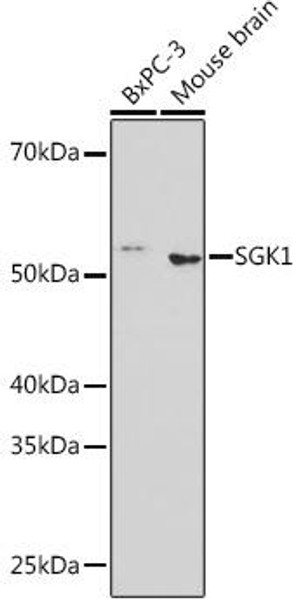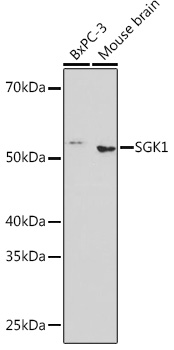Anti-SGK1 Antibody (CAB3936)
- SKU:
- CAB3936
- Product type:
- Antibody
- Reactivity:
- Human
- Mouse
- Host Species:
- Rabbit
- Isotype:
- IgG
- Research Area:
- Cell Death
Description
| Antibody Name: | Anti-SGK1 Antibody |
| Antibody SKU: | CAB3936 |
| Antibody Size: | 20uL, 50uL, 100uL |
| Application: | WB |
| Reactivity: | Human, Mouse |
| Host Species: | Rabbit |
| Immunogen: | A synthesized peptide derived from human SGK1 |
| Application: | WB |
| Recommended Dilution: | WB 1:500 - 1:2000 |
| Reactivity: | Human, Mouse |
| Positive Samples: | BxPC-3, Mouse brain |
| Immunogen: | A synthesized peptide derived from human SGK1 |
| Purification Method: | Affinity purification |
| Storage Buffer: | Store at -20°C. Avoid freeze / thaw cycles. Buffer: PBS with 0.02% sodium azide, 0.05% BSA, 50% glycerol, pH7.3. |
| Isotype: | IgG |
| Sequence: | Email for sequence |
| Gene ID: | 6446 |
| Uniprot: | O00141 |
| Cellular Location: | |
| Calculated MW: | 57kDa |
| Observed MW: | 60KDa |
| Synonyms: | SGK |
| Background: | This gene encodes a serine/threonine protein kinase that plays an important role in cellular stress response. This kinase activates certain potassium, sodium, and chloride channels, suggesting an involvement in the regulation of processes such as cell survival, neuronal excitability, and renal sodium excretion. High levels of expression of this gene may contribute to conditions such as hypertension and diabetic nephropathy. Several alternatively spliced transcript variants encoding different isoforms have been noted for this gene. [provided by RefSeq, Jan 2009] |
| UniProt Protein Function: | SGK1: serum and glucocorticoid-inducible kinase is an AGC protein kinase of the SGK family. Rapidly induced in response to a variety of stimuli including serum, glucocorticoids, follicle stimulating hormone, osmotic shock and mineralocorticoids. Can be activated via PI3K-dependent and -independent pathways. Plays a role in activating certain potassium, sodium and chloride channels, suggesting an involvement in the regulation of processes such as cell survival, neuronal excitability and renal sodium excretion. SGK is negatively regulated by ubiquitin modification and proteasome degradation. |
| UniProt Protein Details: | Protein type:Protein kinase, AGC; Protein kinase, Ser/Thr (non-receptor); EC 2.7.11.1; Motility/polarity/chemotaxis; Kinase, protein; AGC group; SGK family Chromosomal Location of Human Ortholog: 6q23 Cellular Component: cytoplasm; cytosol; endoplasmic reticulum membrane; mitochondrion; neuron projection; nucleoplasm; nucleus; perinuclear region of cytoplasm; plasma membrane Molecular Function:3-phosphoinositide-dependent protein kinase binding; ATP binding; calcium channel regulator activity; chloride channel regulator activity; cofactor binding; potassium channel regulator activity; protein binding; protein serine/threonine kinase activity; protein serine/threonine/tyrosine kinase activity; sodium channel regulator activity; tau protein binding Biological Process: apoptosis; cellular sodium ion homeostasis; glucocorticoid mediated signaling; long-term memory; microtubule depolymerization; negative regulation of apoptosis; negative regulation of microtubule polymerization; neurite morphogenesis; peptidyl-serine phosphorylation; positive regulation of cell growth; positive regulation of dendrite morphogenesis; positive regulation of transporter activity; protein amino acid phosphorylation; regulation of apoptosis; regulation of blood pressure; regulation of catalytic activity; regulation of cell cycle; regulation of cell growth; regulation of cell migration; regulation of cell proliferation; regulation of transcription factor activity; response to DNA damage stimulus; response to stress; sodium ion transport; transmembrane transport; visual learning |
| NCBI Summary: | This gene encodes a serine/threonine protein kinase that plays an important role in cellular stress response. This kinase activates certain potassium, sodium, and chloride channels, suggesting an involvement in the regulation of processes such as cell survival, neuronal excitability, and renal sodium excretion. High levels of expression of this gene may contribute to conditions such as hypertension and diabetic nephropathy. Several alternatively spliced transcript variants encoding different isoforms have been noted for this gene. [provided by RefSeq, Jan 2009] |
| UniProt Code: | O00141 |
| NCBI GenInfo Identifier: | 90185131 |
| NCBI Gene ID: | 6446 |
| NCBI Accession: | O00141.2 |
| UniProt Secondary Accession: | O00141,Q5TCN2, Q5TCN3, Q5TCN4, Q5VY65, Q9UN56, B7UUP7 B7UUP8, B7UUP9, B7Z5B2, E1P583, |
| UniProt Related Accession: | O00141 |
| Molecular Weight: | |
| NCBI Full Name: | Serine/threonine-protein kinase Sgk1 |
| NCBI Synonym Full Names: | serum/glucocorticoid regulated kinase 1 |
| NCBI Official Symbol: | SGK1 |
| NCBI Official Synonym Symbols: | SGK |
| NCBI Protein Information: | serine/threonine-protein kinase Sgk1 |
| UniProt Protein Name: | Serine/threonine-protein kinase Sgk1 |
| UniProt Synonym Protein Names: | Serum/glucocorticoid-regulated kinase 1 |
| Protein Family: | Serine/threonine-protein kinase |
| UniProt Gene Name: | SGK1 |
| UniProt Entry Name: | SGK1_HUMAN |



